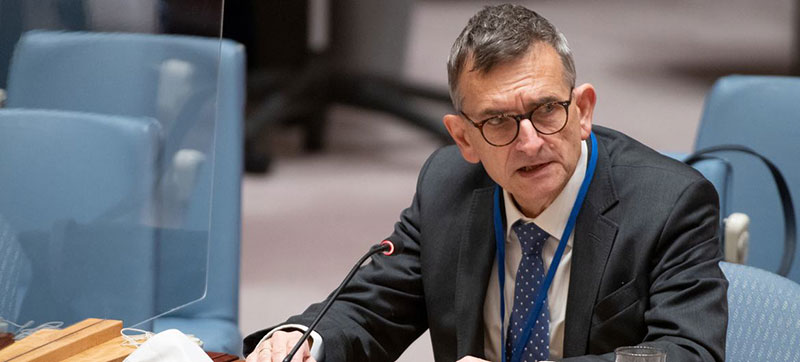 Sudan
Sudan
Sudan: Mistrust deepens following military takeover
New York: In the wake of the 25 October military takeover in Sudan, discussions on the way forward are underway but restoring trust will be a challenge, the top UN official in the country, Volker Perthes, told the Security Council on Friday.
The UN Special Representative briefed ambassadors on a deal last month under which civilian Prime Minister Abdalla Hamdok was reinstated after being detained in the coup along with senior officials and political activists.
Prior to the crisis, military and civilian leaders were sharing power in a government spearheading Sudan’s transition to democracy following the April 2019 ouster of President Omar Al-Bashir, who had ruled for 30 years.
The coup sparked widespread protests, and more than 40 people were killed by security forces.
Lost trust
“The military takeover has exposed and deepened the mistrust between the military and civilian components and within the civilian component itself. And the 21 November Agreement has not led to a rebuilding of lost trust,” said Mr. Perthes, who also heads the UN assistance mission in Sudan, UNITAMS.
The agreement faces “significant opposition” from key stakeholders, including within the Forces of Freedom and Change, a civilian coalition, many of whom feel betrayed by the coup and now reject any dealings with the military.
“Forthcoming decisions on government formation, high-level appointments, and the establishment of transitional institutions, will test the will and ability of the stakeholders to seek a common way out of the crisis,” he added.
Rebuild confidence
The UN envoy warned of the potential for further fragmentation. The agreement stipulates the formulation of a political declaration, which would likely entail constitutional amendments, and proposes the formation of a “technocratic cabinet”.
Mr. Perthes underlined the UN’s readiness to facilitate an inclusive dialogue, both to address unresolved issues for the transitional period and to deal with broader questions as part of the constitutional reform process.
“Sudan’s military and political leaders will primarily have to rebuild trust with their own domestic public, particularly with the young generation. Immediate confidence-building measures and a visible commitment to bring the country back on a democratic transition path will be key,” he said.
The Sudanese authorities will also need to take steps to regain financial, economic, and political support from the international community, he further stated.
He later told the Council that in the aftermath of the coup, donors paused development assistance to Sudan, which is having a significant impact on the people and putting recent achievements at risk.
Measuring progress
Mr. Perthes outlined various indicators that can be used to measure progress in Sudan over the short to medium term, starting with releasing all political detainees, ceasing arbitrary arrests and guaranteeing the right to peaceful protest and assembly.
Accountability for human rights violations in the wake of the coup will also be another area for action, he added, and could help to rebuild confidence.
The Prime Minister’s ability to freely form his technocratic cabinet, is another key indicator, as are lifting the state of emergency, and restoring freedom of the press.
However, restoration of political space will be the main indicator for a return to the path to democratic transition.
“This is particularly important in light of the professed goal by political and military leaders to hold free and fair elections possibly even earlier than originally planned. The authorities will need to ensure a conducive atmosphere for credible elections which the United Nations and other international actors can then support,” he said.
Support Our Journalism
We cannot do without you.. your contribution supports unbiased journalism
IBNS is not driven by any ism- not wokeism, not racism, not skewed secularism, not hyper right-wing or left liberal ideals, nor by any hardline religious beliefs or hyper nationalism. We want to serve you good old objective news, as they are. We do not judge or preach. We let people decide for themselves. We only try to present factual and well-sourced news.







